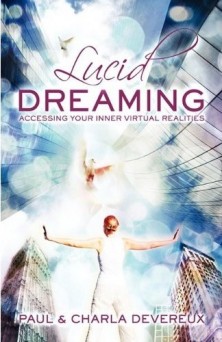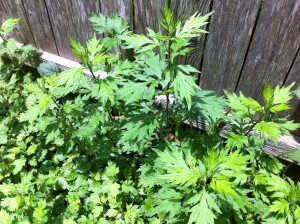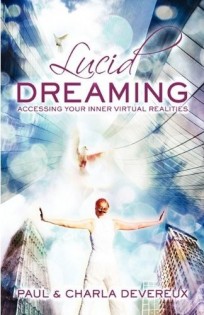I just finished reading Paul and Charla Devereux’s updated classic Lucid dreaming. Originally published in 1998, this new edition by DailyGrail Press has additional content for a new generation of readers.
In two words: highly recommended.
 At first glance, this husband and wife team are an unlikely duo for a lucid dreaming book. Paul’s expertise is cognitive archaeology and earth mysteries, and Charla is most widely known for her bestselling book the Aromatherapy Kit.
At first glance, this husband and wife team are an unlikely duo for a lucid dreaming book. Paul’s expertise is cognitive archaeology and earth mysteries, and Charla is most widely known for her bestselling book the Aromatherapy Kit.
But these dynamic writers have crafted an easy-to-read introduction to lucid dreaming that combines their personal experiences, interesting historical context and some unique tales from the early days of lucid dreaming research.
In fact, the original research is what impresses me the most.
How many times have you heard the story of how Stanford researcher Stephen LaBerge thought he was the first to verify lucid dreaming in the laboratory, only to discover Keith Hearne did it two years prior using the same method?
The authors contacted Hearne and heard his side of the story, a fascinating account about his trials and tribulations. Hearne’s experience makes clear the resistance of the scientific establishment in the 1970s to acknowledging the reality of consciousness in the dream state.
Lucid dreaming in context
This readable volume also provides the best framework of lucid dreaming yet in print.
That’s a bold claim, I know. [pullquote]This readable volume also provides the best framework of lucid dreaming yet in print.[/pullquote]Let me explain: the authors contextualize lucid dreaming within the history—and prehistory—of dreams in a way that shows both the depth and breadth of this profound altered state and its expression throughout human history.
This is exactly what Paul Devereux has accomplished in his other books as well, and it’s so refreshing to see his vision applied to the dreaming arts.
The first chapter is a fascinating tale that covers ancient lucid dreaming practices, the role of the Church on lucid dreaming suppression, the subsequent “rediscovery” of lucid dreaming my 19th century psychologists, and modern sleep science. This grounding is essential to lucid dreaming, because we don’t just “wake up” in a vacuum.
Correcting misconceptions
Lucid dreaming also clears the air of some oft-repeated misinformation about lucid dreaming. Contrary to popular belief, Frederick van Eeden did not coin the phrase “lucid dream.” Rather, he translated into English the same phrase from the French “rêve lucide.”
[pullquote]“Dream dictionaries are dumb.”[/pullquote]The inventor of this phrase is the Marquis d’Hervey de Saint-Deny, a scholar of Chinese literature who published his personal lucid dreaming experiences in the 1867 book Les rêves et les moyens de les diriger (Dreams and the Ways to Direct Them: Practical Observations).
Other popular misconceptions discussed include the true nature of dream control (harmless fun but missing the point) and the value of dream dictionaries (limited). They quote dream researcher Tore Nielsen on this last point: “Dream dictionaries are dumb.”
The oldest Lucid Technique you haven’t heard of: Aromatherapy
The middle section of Lucid dreaming is dedicated to induction practices. Most are well-known by now. The usual induction masters are reviewed: LaBerge, Castaneda, and Paul Tholey. However, the Devereuxs do an excellent job leading beginners through the process of remembering more dreams and discovering what works best for you.

But then Charla lends her aromatherapy expertise to lucid dreaming induction, with expert suggestions that can electrify your intention and increase the odds of lucidity when asleep. She has sold over a million copies of her aromatherapy book, by the way, so her advice is solid when it comes to the effects of plant essences on consciousness.
Of course, dream pillows have been used for such purposes for hundred of years, but admittedly the empirical evidence for this claim is lacking.
Still, strands of evidence do exist.
Researchers have found that smells can increase the vividness of dreams, as well as enhance positive emotions in dreams. Also, other researchers have found that memory can be reliably improved when subjects go to sleep smelling botanical infusions. Taken together, aromatherapy may indeed improve recall of a lucid intention, as well as provide more vivid opportunities to go lucid in the dream.
This revitalized my desire to keep mugwort by my bed, a classic dream herb that happens to grow in my front yard.
The spectrum of lucidity
Finally, Lucid dreaming contains balanced discussions about related altered states of consciousness, including out-of-body experiences and sleep paralysis visions. Ever careful, the arguments are presented for and against the common perspective that OBEs are actually the soul in travel (this is called naïve realism, or the folk psychology view).
 They also present a holistic theory linking lucid dreaming, OBEs and false awakening dreams as a continous set of related mental events. I am delighted to see their model, as it has neat parallels with other dream research theories, such as Alan Hobson’s AIM, Harry Hunt’s dream diamond and Ernest Hartmann’s continuity model.
They also present a holistic theory linking lucid dreaming, OBEs and false awakening dreams as a continous set of related mental events. I am delighted to see their model, as it has neat parallels with other dream research theories, such as Alan Hobson’s AIM, Harry Hunt’s dream diamond and Ernest Hartmann’s continuity model.
Lucid dreaming: accessing your inner virtual realities is a great read. My least favorite part of it is the title, actually. The metaphor of virtual reality is dated, and does not really jive with the nuanced and historical view of lucidity that the Devereuxs present within.
The rest of the book, I’m happy to report, is filled with timeless wisdom. For lucid dreaming beginners, I recommend this book wholeheartedly, and it will captivate more experienced dreamers as well.
Here’s where to get your own copy.
Very interesting, Ryan, thank you. Lately in my dreams, both lucid and “normal”, I’ve been tasting foods and hearing sounds, feeling hot or cold and, just last night, catching the whiff of a scent. I seem to be stretching my senses like mysterious muscles instead of relying mostly on sight and touch. Therefore, just the passages on aromatherapy make me want to read this book.
But equally intriguing and relevant for me is that “the authors contextualize lucid dreaming within the history—and prehistory—of dreams in a way that shows both the depth and breadth of this profound altered state and its expression throughout human history.” I’m incubating a collection of stories (working title “Dreaming Through the Centuries”) and it’s fascinating how material/information I need always appears just when I’m ready to receive it. Synchronicity. (Also, thank you for your review of “Archaeologies of Consciousness” by Gyrus. I’m reading that now and am blown away; the man has a mind like a laser beam!:-)
As for dream dictionaries being dumb, I agree for the most part, however, I feel an indepth dictionary of symbols is great to have, such as the one published by Penguin Reference books written by Jean Chevalier & Alain Gheerbrant.
Thanks again for your indepth review. Now I’m off to pick some mugwort to put by my bed!
thanks for the great comment Maria! lovely to hear about your “sensual” lucid dreams beyond sight and sound.
If you like Gyrus, you’ll love Devereux’s work. He’s really doing more than anyone else in terms of dreams, consciousness and sacred sites.
And finally, I don’t hate dream dictionaries, I just think they are over-rated. Dream dictionaries provide two important levels of symbolism: the cultural level and pan-human existential symbols. It’s not a bad place to look if I’m clueless about a specific image in a dream.
dream images are shifty though, and we constantly subvert and invert accepted meanings and forge new ones that are personal. that’s where dream dictionaries can lead one astray.
Where would I get mugwort seeds to grow in my yard for lucid dreaming enhancement?
Mugwort grows wild all over the place. It’s definitely in the Carolinas. try looking at banks of creeks and other shady locales close to water. If no luck, you can buy it from several online vendors. My favorite is Mountain Rose Herbs – they harvest sustainably. Here’s an article I wrote a while back for more info: http://dreamstudies.org/2008/04/14/mugwort-helps-with-remembering-dreams/
Thanks for the review, I’ve only read 1 book 15 years ago on lucid dreaming but this sounds intriguing especially the historical side and the altered state, SP, and OBE discussion.
I also wanted to pass this on since your review of supplements helped me to find a mixture that has been 99.9% successful. I take 200mg of 5-htp, 500mg of a choline & inositol pill, 300mg of Alpha GPC, and 8 mg of Galantamine about 1-2 hours before I go to sleep. With this, I focus as I fall asleep into SP and have gone into lucid dreams, I’ve woke myself up, and gone back into another one several times over with full consciousness/awareness.
Thanks again Ryan, I’ll be reading this book soon!